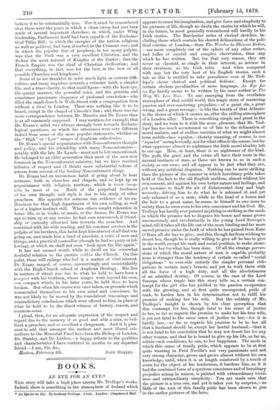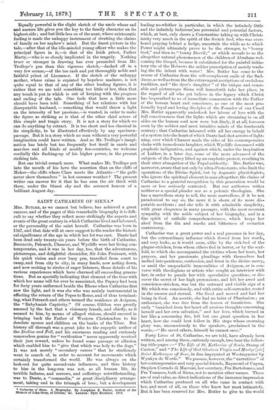BOOKS.
AN EYE FOR AN EYE.* Tars story will take a high place among Mr. Trollope's works. Indeed, there is something in the atmosphere of Ireland which
• An Bye for an Eye. By Anthony Trollops. 2 sob. London: Chapman & Hall.
appears to rouse his imagination, and give force and simplicity to' his pictures of life, though no doubt the stories by which he will,
in the future, be most generally remembered will hardly be his Irish stories. The Barchester series of clerical sketches, in- cluding those which contain his shrewd delineations of the poli- tical coteries of London,—from The Warden to Phineas
—are more completely out of the sphere of any other writer,. and fuller of careful and complex observation, than any which he has written. But for that very reason, they are never as classical, as single in their interest, as intense in their vividness, as his Irish tales. And when compared with any but the very best of his English stories, such a tale as this is entitled to take precedence even of Mr. Trol-
lope's clever clerical and political fictions. Except for certain obvious peculiarities of mere language, An Eye for an Eye hardly seems to be written by the same author as The TVay We Live Now. To one emerging from the overladen atmosphere of that sordid world, this tragic story of mastering- passion and over-mastering prejudice,—of a great sin, a great wrong, and a great revenge,—is like the breath of that Atlantic to the shores of which it carries us, after the stiffing atmosphere-
of a London alley. There is something simple and great in the story, and we turn to it with the more pleasure, that Mr. Trot- lope has too much accustomed us of late to the delineation of
moral malaria, and of endless varieties of what we might almost• term middle-class squalor,—thereby meaning, of course, to use-
"squalor" metaphorically, not for what offends the senses, but for- what oppresses almost to nightmare the little moral ideality left to our age. Here, at least, there is no nightmare of the kind_ Theguilt, the grief, and the crime all have their roots in the
natural instincts of man, as these are known to us in such a. society as our own ; and all appear to be just what they are,.
without any artificial disguises. Nothing can be more striking than the picture of the manner in which hereditary pride takes hold of the heir to the old English earldom, almost without his own consent, and against his own better nature and feelings, and yet assumes to itself the air of disinterested duty and high necessity, driving him to do what he is ashamed of, and yet only ashamed of as a man; while as the head of a house and the heir to a great name, he seems to himself to owe more to society than he owes even to his own conscience and his God. Mr- Trollope has hardly ever painted anything so striking as the mode in which the promise not to disgrace his house and name grows unconsciously and involuntarily in the young Lord Scroope's mind, till it takes all the life out of the more binding and far more- sacred promise under the faith of which he has gained from Kate O'Hara all she has to give; and this, though far from wishing to. desert her, though he is really willing to give all he has to give- in the world, except his rank and social position, to make atone- ment to her for what has been done. Of all the strange perver- sions of which the moral nature of men is capable, probably none is stranger than the tendency of certain so-called " social obligations " to over-ride entirely the simpler personal obli- gations in certain men's breasts, and yet to work there with
all the force of a high duty, and all the absoluteneass of an admitted destiny. Of course, in the case of the Lord Scroope whose tragic fate this story tells us, a certain con- tempt for the girl who has yielded to his passion co-operates with the growing, and at first quite unsuspected, pride of rank, to harden him in his determination not to fulfil his promise of making her his wife. But the subtlety of Mr.. Trollope's insight is shown by his clear perception that this contempt for her, though fatal to his sense of justice to her, so far as regards the promise to make her his true wife,. is yet not fatal to the same sense of justice to her,—for it is hardly less,—so far as regards his promise to be to her all that a husband should be, except her lawful husband,—that it is not fatal to his conviction that he may not desert her for any other woman, and that he is bound to give up his life, so far as,. within such conditions, he can, to her happiness. The mode in which this sense of family pride, which appears to be at first quite wanting in Fred Neville's not very passionate and not very strong character, grows and grows almost without his own.. knowledge, until, when it is at length reinforced by a touchof scorn for the object of his tenderness, it hardens him, as if it had the combined force of a spurious conscience and of hereditary prejudice acting in unison, is painted with extraordinary vivid- ness and extraordinary simplicity. You are made sure that the picture is a true one, and yet it takes you by surprise,---so, little of the root of this family pride has been shown to you in the earlier pictures of the hero.
Equally powerful is the slight sketch of the uncle whose sad and austere life gives you the key to the family character on its highest side ; and but little less so of the aunt, whose aristocratic feeling is made the unhappy instrument of rivetting the claims of family on her nephew's mind. But the finest picture in the tale,—after that of the idle-minded young officer who makes the principal figure in it,—is that of the Irish priest, Father Marty,—who is so closely implicated in the tragedy. Nothing truer or stronger in drawing has ever proceeded from Mr. Trcdlope's pen than this vigorous sketch,—dashed off in a very few scenes,—of the too rash and yet thoroughly noble and faithful priest of Liscannor. If the sketch of the unhappy mother, whose crime is expiated by hopeless madness, is not quite equal to that of any of the other leading figures, it is rather that we are told something too little of her, than that any touch is put in. which is out of keeping with the progress and ending of the tale. One feels that here a little more should have been told. Something of her relations with her disreputable husband, — something that would throw a light on the intensity of her passions,—is wanted, in order to make the figure as striking as is that of the other chief actors of this simple and tragic story. It is not a story for which we can do anything by extract. It is too short and too classical in its simplicity, to be illustrated effectively by any specimen- passage. But it is a story which no man without a very powerful imagination could have written. And as Mr. Trollope's imagi- nation has lately but too frequently lost itself in sands and marshes and all kinds of muddy fen-countries, we welcome cordially this flashing-up of his higher power, in the present striking tale.
But one trivial remark more. What makes Mr. Trollope put into the mouth of his hero the assertion that on the cliffs of Moher—the cliffs where Clare meets the Atlantic—" the gulls never show themselves " in hot summer weather ? The present writer can answer for it that he has seen the air thick with them, under the bluest sky and the serenest heaven of a brilliant August day.



































 Previous page
Previous page